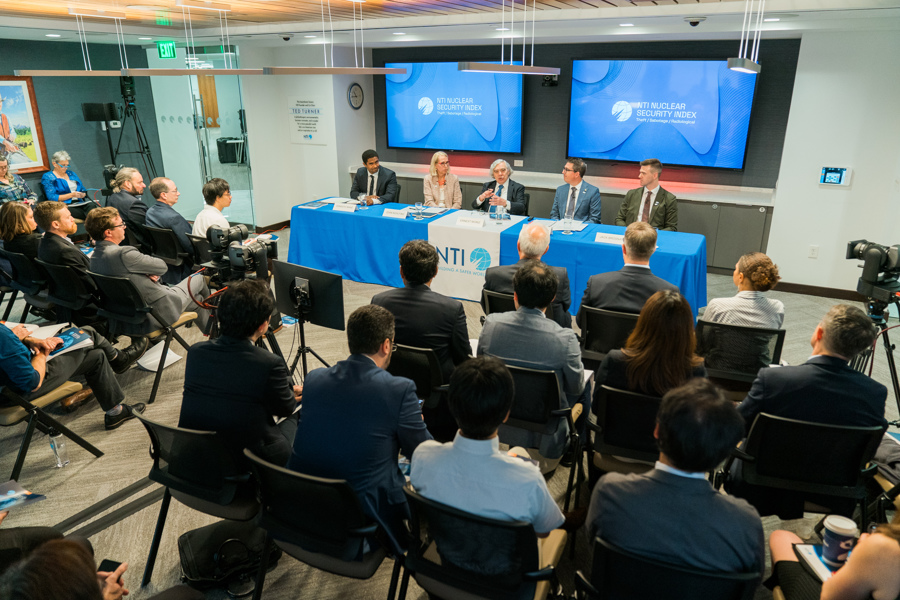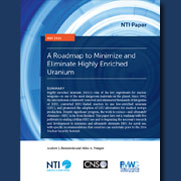U.S. Department of Energy and NTI Announce Key Nonproliferation Project with Kazakhstan
Agreement Reached To Downblend HEU and Convert Reactor
WASHINGTON, D.C. – The U.S. Department of Energy and the Nuclear Threat Initiative (NTI) today announced that they have reached an important agreement-in-principle with the Government of Kazakhstan to move forward with the down-blending of highly enriched uranium (HEU) currently stored at Kazakhstan’s Institute of Nuclear Physics. The agreement also calls for the conversion of the VVR-K research reactor to operate on low enriched uranium fuel instead of HEU, which can be used in nuclear weapons. The agreement is an important step forward in fulfilling Kazakhstan President Nursultan Nazarbayev’s pledge late last year to rid his country of its HEU.
“This agreement represents another example of the kind of productive cooperation the United States and Kazakhstan have shared in furthering nuclear nonproliferation,” said U.S. Secretary of Energy Samuel W. Bodman. “Our cooperative efforts support the Bush Administration’s Global Initiative to Combat Nuclear Terrorism, recently announced by Presidents Bush and Putin.”
The project will be administered through the Department of Energy’s National Nuclear Security Administration (NNSA). NNSA’s Global Threat Reduction Initiative (GTRI) will work with Kazakhstan to make arrangements for the down-blending of the HEU at the Ulba Metallurgical Plant in Kazakhstan and to initiate conversion of the VVR-K reactor. GTRI will contribute at least $4 million to this important threat reduction initiative.
NTI played a key role in the agreement being reached by committing up to $1.3 million for a new reactor control and protection system to improve reactor safety and a beryllium reflector to enhance reactor performance.
“Kazakhstan and the United States are to be commended for the foresight and creativity needed to make this agreement a reality,” said former Senator Sam Nunn, the co-chair of NTI. “This project is an example of how governments, the private sector, and international organizations can work together to find innovative and effective solutions to make the world safer. NTI is proud to have played a role in making it happen. Under President Nazarbayev’s leadership, Kazakhstan led the way in getting rid of all its nuclear weapons after the break-up of the Soviet Union and is once again showing the world a safer path by converting its weapons-usable highly enriched uranium to low enriched uranium.”
“This nonproliferation cooperative project with Kazakhstan is critical to our efforts to eliminate excess amounts of potentially dangerous material around the world. Only through cooperation with the international community can we reduce the threat of nuclear terrorism,” said NNSA Administrator Linton F. Brooks.
Today’s agreement follows a May 2006 agreement between the governments of Kazakhstan and the U.S. related to NNSA’s Second Line of Defense program. Under that program, U.S. and Kazakhstan officials are working together to install radiation detection and integrated communications equipment at strategic border crossings in Kazakhstan to identify and deter illicit nuclear and radiological materials.
NTI is a nonprofit, nonpartisan organization dedicated to reducing the global threats from nuclear, biological and chemical weapons and is governed by an international Board co-chaired by philanthropist Ted Turner and former Senator Sam Nunn.
The mission of GTRI is to identify, secure, recover and/or facilitate the final disposition of high-risk vulnerable nuclear and radiological materials around the world as quickly as possible. To date, approximately 230 kilograms of HEU have been returned to the Russian Federation from vulnerable sites around the world and 43 research reactors worldwide have been converted from operating on HEU.
Established by Congress in 2000, NNSA is a semi-autonomous agency within the U.S. Department of Energy responsible for enhancing national security through the military application of nuclear science. NNSA maintains and enhances the safety, security, reliability and performance of the U.S. nuclear weapons stockpile without nuclear testing; works to reduce global danger from weapons of mass destruction; provides the U.S. Navy with safe and effective nuclear propulsion; and responds to nuclear and radiological emergencies in the U.S. and abroad. Visit www.nnsa.doe.gov for more information.




